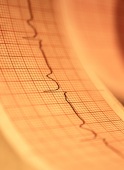 |
 |
 |
||
    |
||||
|
||||

Control Your Anger, Help Your Heart
Yale project looks at electrocardiogram patterns for those with implanted defibrillators|
|
HealthDay
Monday, February 23, 2009
 MONDAY, Feb. 23 (HealthDay News) -- Here's a hopeful possibility for those who suffer from arrhythmia, also known as irregular heartbeat:
MONDAY, Feb. 23 (HealthDay News) -- Here's a hopeful possibility for those who suffer from arrhythmia, also known as irregular heartbeat:
If you learn how to control your emotions, you might not need an implanted defibrillator.
That's the hope of a research project headed by Dr. Rachel Lampert, associate professor of cardiology and electrophysiology at Yale University. It's based on a phenomenon called T-wave alternans, and it's getting attention in the cardiology community.
The T-wave is the last bump in the electrocardiogram (ECG), which records the electrical activity of the heart as it beats. T-wave alternans is a wide variation in the height or regularity of that bump. A number of studies have linked T-wave alternans to the risk of a potentially fatal heart arrhythmia that can be prevented by implanting a defibrillator, which delivers jolts to keep the heart beating regularly.
T-wave alternans can be detected by a physical stress test. A report by Lampert in the March 3 issue of the Journal of the American College of Cardiology on 62 people with implanted defibrillators widened that finding by having them take a mental stress test, something as simple as remembering a recent situation in which they were angered or aggravated.
Over the next three years, 16 percent of the participants experienced arrhythmias that set off their implanted defibrillators, and they were found to have higher T-wave alternans than those who did not have arrhythmias.
"One implication of our study is that the changes in the ECG you see with anger are what you see in a stress test," Lampert said. "Is the anger test as good as a stress test? This suggests that it is."
The study also helps show why anger can lead to sudden death, she said. "Feeling angry can bring on arrhythmias," Lampert said. "It shows what anger does to the heart electrical system. In the laboratory, anger is predictive of having arrhythmias in the future."
It's possible that an anger test can be as predictive of future as a physical stress test, she said, "but it is too early to say we can implant a defibrillator on the basis of T-wave alternans."
And because the study indicates that anger can cause electrical instability of the heart, "it suggests that interventions aimed at controlling anger could be a way to decrease exposure to arrhythmias," Lampert said. That belief is being tested by a study now being done at Yale.
"We take people who have defibrillators, measure their T-wave alternans and enroll them in a self-control program," she said. "We want to see if we can perhaps improve their quality of life."
The study will last about five years, Lampert said. Meanwhile, some of its objectives can be put into real-life practice, she said.
"We are thinking about how we manage stress in our lifetimes," Lampert said. "We are thinking about psychological stress management. There are lots of ways people can manage stress in their lives."
An accompanying editorial by Dr. Eric J. Rashba, professor of medicine and director of electrophysiology at the Heart Center at Stony Brook University Hospital in New York, said that the study results "provide the first evidence that patients with higher levels of anger-induced T-wave alternans during provocative testing are at greater risk for ventricular arrhythmias detectable by implanted cardiac defibrillators."
But he wrote that further studies are needed to prove the value of anger-induced T-wave alternans in predicting the need for implanted defibrillators.
HealthDay
Copyright (c) 2009 ScoutNews, LLC. All rights reserved.
Related News:
More News on this Date
Related MedlinePlus Pages:
| Home | Health Topics | Drugs & Supplements | Encyclopedia | Dictionary | News | Directories | Other Resources | |
| Disclaimers | Copyright | Privacy | Accessibility | Quality Guidelines U.S. National Library of Medicine, 8600 Rockville Pike, Bethesda, MD 20894 National Institutes of Health | Department of Health & Human Services |
Date last updated: 24 February 2009 |
